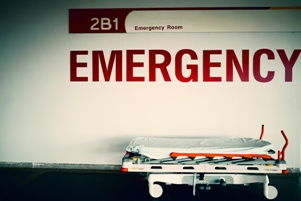 Each year, millions of Americans seek emergency room care for brain injuries, but are they getting the medical care they need? For many people who suffer brain injuries in motor vehicle collisions, falls, and other types of accidents, the emergency room is the first place they receive treatment. Brain injuries can be life-threatening or result in permanent injuries. Emergency rooms can prevent some deaths and stop some brain injuries from progressing if the staff acts quickly.
Each year, millions of Americans seek emergency room care for brain injuries, but are they getting the medical care they need? For many people who suffer brain injuries in motor vehicle collisions, falls, and other types of accidents, the emergency room is the first place they receive treatment. Brain injuries can be life-threatening or result in permanent injuries. Emergency rooms can prevent some deaths and stop some brain injuries from progressing if the staff acts quickly.
Brain Injury Symptoms
Right after an accident, you might not know if you suffered a brain injury. Emergency room staff, however, should be able to make a diagnosis and provide medical treatment, if necessary. Potential symptoms of a brain injury that should cause you to get emergency care include:
- Loss of consciousness
- Confusion
- Headache with nausea or vomiting
- Severe headache
- Cognitive difficulties
- Unusual behavior
- Weakness
- Numbness
- Speech problems
- Eye movement problems
- Seizures
- Vomiting
- Trouble waking up
- Clear or bloody discharge from the nose or ears
- Any of the above symptoms that progress or get worse
Once you go to an emergency room with these symptoms, emergency room staff should promptly assess your symptoms, recognize the potential seriousness of the situation, order the right tests to diagnose your injury, and recommend treatment or transfer to the hospital.
Why Emergency Room Delays Happen
Emergency rooms don’t know how many people are coming to the emergency room for care at any given time or what illnesses and injuries they may have until they get there. Therefore, emergency rooms must use a triage process to assess which patients need the most immediate treatment. For example, a person suffering a heart attack or stroke needs more urgent care than a person with a broken bone.
Many brain injury symptoms indicate a potentially dangerous medical condition. However, triage may not work properly, and a brain injury patient may not get prompt care if:
- The emergency room is understaffed
- Emergency room staff are overtired or overworked
- The emergency room did not have proper triage procedures in place
- Emergency room staff were not adequately trained in triage procedures
Any one of these mistakes could cause a brain injury patient to wait too long for treatment.
Emergency Room Delays May Make Brain Injuries Worse
Quick brain injury treatment doesn’t always stop an injury from progressing. However, when an emergency room delay allows a brain injury to progress, a person can be left with complications that never had to happen. For some patients, a prompt diagnosis and treatment plan can prevent serious complications such as a progression of injuries, a permanent injury, or death.
What to Do After an ER Delay-in-Care Brain Injury
Emergency room staff did not cause the brain injury, but a triage mistake or other delay in care did cause your injury to worsen, or caused the death of a loved one.
Now, you should waste no time in getting the legal help you need. Our lawyers and staff nurse have experience in both delay-in-care medical malpractice and brain injury cases. We know what evidence to look for and how to find out exactly what happened in your case.
If you were injured by a delay in care or your loved one died because of an emergency room’s delay in care, we will fight for your fair recovery of damages. We will work toward a settlement with the right insurance company or defendant. However, if the other side is unwilling to provide you with a recovery that compensates you for all of your past and future medical needs, lost income, out-of-pocket costs, physical pain, or emotional suffering, we will go to trial.
Medical malpractice cases are often complicated. Without the help of an experienced law firm, you risk leaving money on the table. We don’t want this to happen to you. Call us or start a live chat with us now to schedule your free, no-obligation consultation. Let’s talk about your rights, your possible recovery, and our No-Fee Policy as soon as possible.
Related Links: